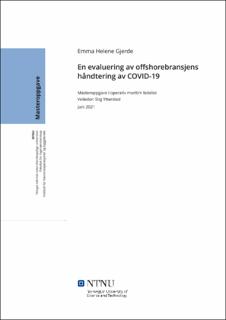| dc.contributor.advisor | Ytterstad, Stig | |
| dc.contributor.author | Gjerde, Emma Helene | |
| dc.date.accessioned | 2021-10-03T16:22:57Z | |
| dc.date.available | 2021-10-03T16:22:57Z | |
| dc.date.issued | 2021 | |
| dc.identifier | no.ntnu:inspera:86260897:86622546 | |
| dc.identifier.uri | https://hdl.handle.net/11250/2787188 | |
| dc.description.abstract | Denne oppgaven tar for seg håndteringsprosessen til tre offshore-rederi i Ålesund omegn opp imot viruset COVID-19. Det finnes lite faglitteratur om emnet, da det er en ny situasjon for de fleste som har bydd på mange forskjellige utfordringer.
Problemstillingen er:
«Hvordan har ulike rederier i Ålesund omegn håndtert situasjonen med COVID-19?»
For å svare på problemstillingen er det benyttet teori knyttet til menneskelige faktorer, som persepsjon og situasjonsbevissthet. Videre blir det sett på teori rundt begrepet risikosamfunn og kriseledelse, derunder krisehåndtering og krisekommunikasjon.
I dette studiet benyttes kvalitativ metode med en hermeneutisk fenomenologisk tilnærming ved bruk av semistrukturert intervju. Utvalget består av fem ansatte i ledelsesposisjoner fra tre ulike rederi, hvor de alle har flere års erfaring innen offshorebransjen. Dataprogrammet NVivo og teorien bak systematisk tekstkondensering er valgt som analysemetode av de transkriberte intervjuene.
Hovedfunnene for studiet er at kommunikasjon, eksterne kanaler og implementering av tiltak har spilt en viktig rolle for håndteringen av COVID-19. Kommunikasjonen er av betydning for å holde alle parter informert, samtidig som eksterne kanaler har vært kritisk for å innhente nødvendig informasjon. Uten iverksetting av tiltak ville det ikke vært mulig å håndtere smittespredning, selv om det har skapt store utfordringer for alle rederiene.
Ut ifra de ressursene som har vært tilgjengelig, har rederiene tatt gode beslutninger ved håndtering av situasjonen med COVID-19 så langt. Det kan derimot argumenteres for videre diskusjon opp imot rederienes forberedelser mot globale pandemier. | |
| dc.description.abstract | This paper aims to investigate the handling process of three offshore shipping companies in the area around Aalesund concerning the COVID-19 virus. There are limited resources on the subject, as this is a new situation for most people that has offered many different challenges.
The research question is:
«How have various shipping companies in the area around Aalesund handled the situation with COVID-19?»
To answer this problem, theory related to human factors, such as perception and situational awareness, has been used. Furthermore, the paper looks at theory around the concept of risk society and crisis management, including how to handle a crisis and crisis communication.
In this study I have used a qualitative method with a hermeneutic phenomenological approach in addition to using a semi-structured interview. The study’s selection consists of five employees in management positions from three different shipping companies, with several years of experience in the offshore industry. The computer program NVivo and the theory behind systematic text condensation have been chosen as the analytical method for the transcribed interviews.
The main findings of the study shows that communication, external channels and implementation of measures have played an important role when handling COVID-19. Communication is important to keep all parties informed, while external channels have been critical in obtaining the necessary information. Without the implementation of measures, it would not have been possible to deal with the spread of infection, even though it has created major challenges for all the shipping companies.
Based on the resources that have been available, the shipping companies have made good decisions in handling the situation with COVID-19 so far. On the other hand, it can be debated for further discussion regarding the shipping companies' preparations for global pandemics. | |
| dc.language | nob | |
| dc.publisher | NTNU | |
| dc.title | En evaluering av offshorebransjens håndtering av COVID-19 | |
| dc.type | Master thesis | |
